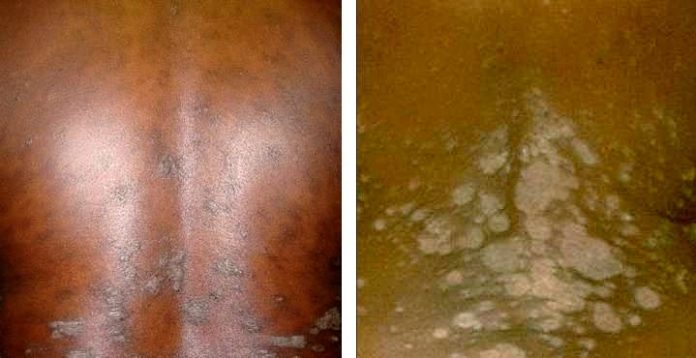You’re going about your day when suddenly, you notice an unwelcome visitor on your skin – a patch of red, itchy, and irritating patch that seems to have appeared out of nowhere. As the days go by, this patch comes and goes, leaving you scratching your skin in frustration.
You start to wonder, “Is this eczema or psoriasis?”
Eczema and psoriasis are two of the most common skin conditions, affecting millions of people worldwide. While they may share some similarities, such as causing itchy and inflamed skin, these two conditions are distinct and require different approaches to treatment.
Eczema or psoriasis?
Psoriasis, particularly plaque psoriasis, is characterized by well-defined, thick, silvery-white, scaly patches that commonly appear on the elbows, knees, scalp, and lower back, according to the American Academy of Dermatology (AAD). In contrast, atopic dermatitis, the most common form of eczema, manifests differently in children and adults.
Prof. A.O. George, a dermatologist at the University of Ibadan Teaching Hospital in Nigeria, explains, “In children, eczema often appears as a dry, scaly, red rash in the creases of the elbows or knees. Adults with eczema, on the other hand, tend to have patches of thicker or leathery skin, which can occur on the face or hands.”
Causes, age of onset, and itch intensity
To differentiate between eczema and psoriasis, it’s essential to consider three key factors: cause, age of onset, and itch intensity. Psoriasis is an immune-mediated condition, where an overactive immune system causes skin cells to grow too quickly, leading to thick, scaly patches. Eczema, however, is thought to be caused by a combination of genetic and environmental factors, according to the National Eczema Association (NEA).
Age of onset is another distinguishing factor. “Eczema frequently develops in babies and children, while psoriasis often starts during early adulthood,” says Prof. A.O. George.
“However, it’s important to note that people of all ages can experience these conditions.”
Itch intensity is a significant difference between eczema and psoriasis.
Dr. Nonhlanhla Khumalo, a dermatologist at the University of Cape Town in South Africa, notes, “With psoriasis, the itching may be mild to moderate, but for eczema, it is common, can be intense, and can affect sleep, as reported by the AAD and NEA.”
A closer look at eczema
According to recent studies conducted in Nigeria, eczema, particularly atopic dermatitis (AD), accounts for the highest percentage of cases seen in dermatology clinics, ranging from 30-35% of all skin diseases.
These studies also reported a prevalence rate of AD between 7.92% and 8.5% in the Nigerian population. In comparison, the National Eczema Association (NEA) states that eczema affects at least 30 million Americans, with 16.5 million adults experiencing AD, the most common form of eczema.
These findings highlight the significant burden of AD in both African and American populations, underlining the importance of understanding and effectively managing this condition.
Symptoms of AD differ between children and adults. In children, eczema often appears as a rash on the neck, elbows, wrists, legs, or ankles, causing intense itching. This can lead to the “itch-scratch cycle,” where scratching leads to inflammation and more itching, as described by the NEA.
“Childhood AD may go away or improve with age, but in some cases, the condition persists into adulthood,” explains Dr. Khumalo. “In adults, AD can manifest as thickened or darker patches, especially around the eyes.” Common eczema triggers include dry skin, irritants, certain fabrics, and stress, according to the NEA.
Understanding Psoriasis
Psoriasis affects nearly 8 million American adults and has several subtypes, with plaque psoriasis being the most common, affecting 80% of people with the condition, as reported by the National Psoriasis Foundation (NPF). Psoriasis is a chronic disease that requires lifelong management and can increase the risk of developing other health issues, such as cardiovascular disease or arthritis.
Prof. George explains, “Psoriasis may cause thick patches of silvery scales anywhere on the body, but these plaques appear most commonly on the knees, elbows, and scalp. It can also affect the palms, soles, nails, genitals, and skin folds.” Common triggers for psoriasis include stress, skin injury, medications, and infection, according to the NPF.
Treatment
While there are currently no cures for eczema or psoriasis, working with a dermatologist to develop a personalized treatment plan can help manage symptoms and improve quality of life.


